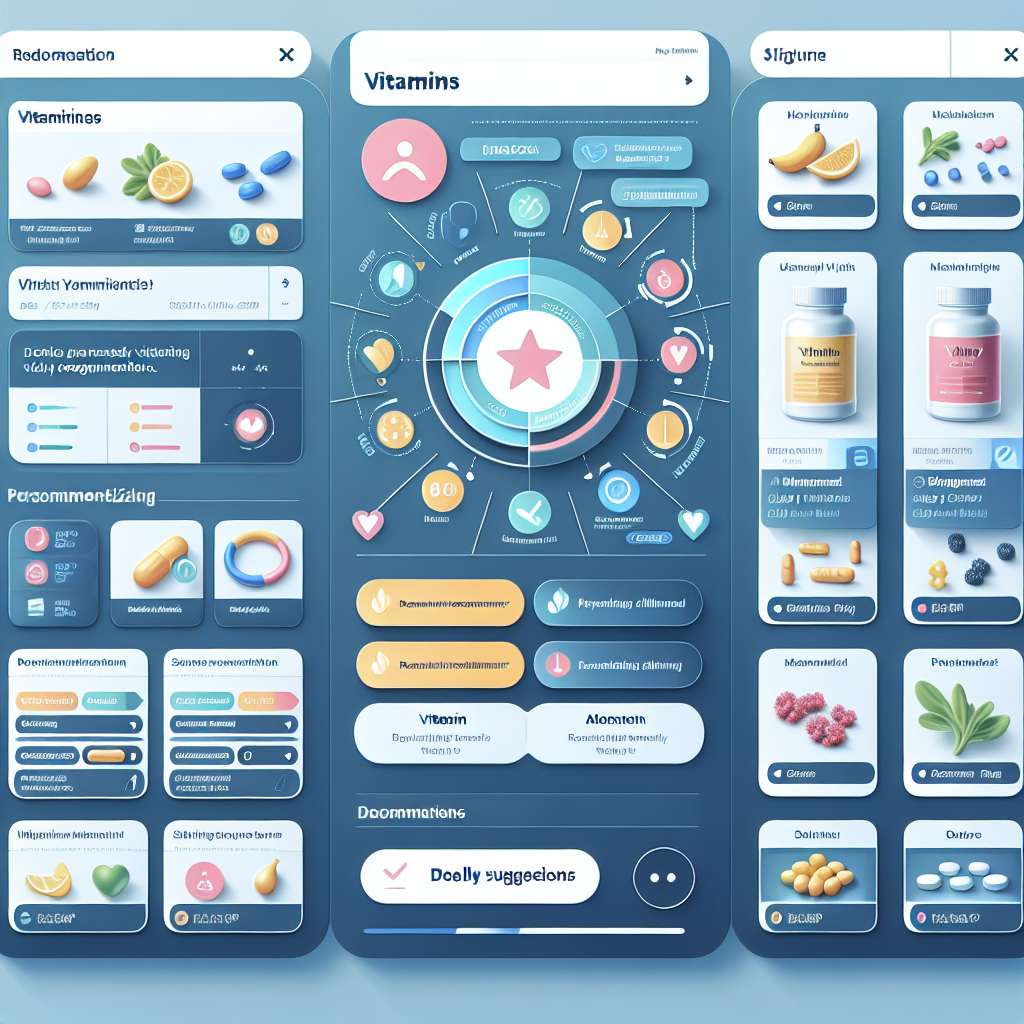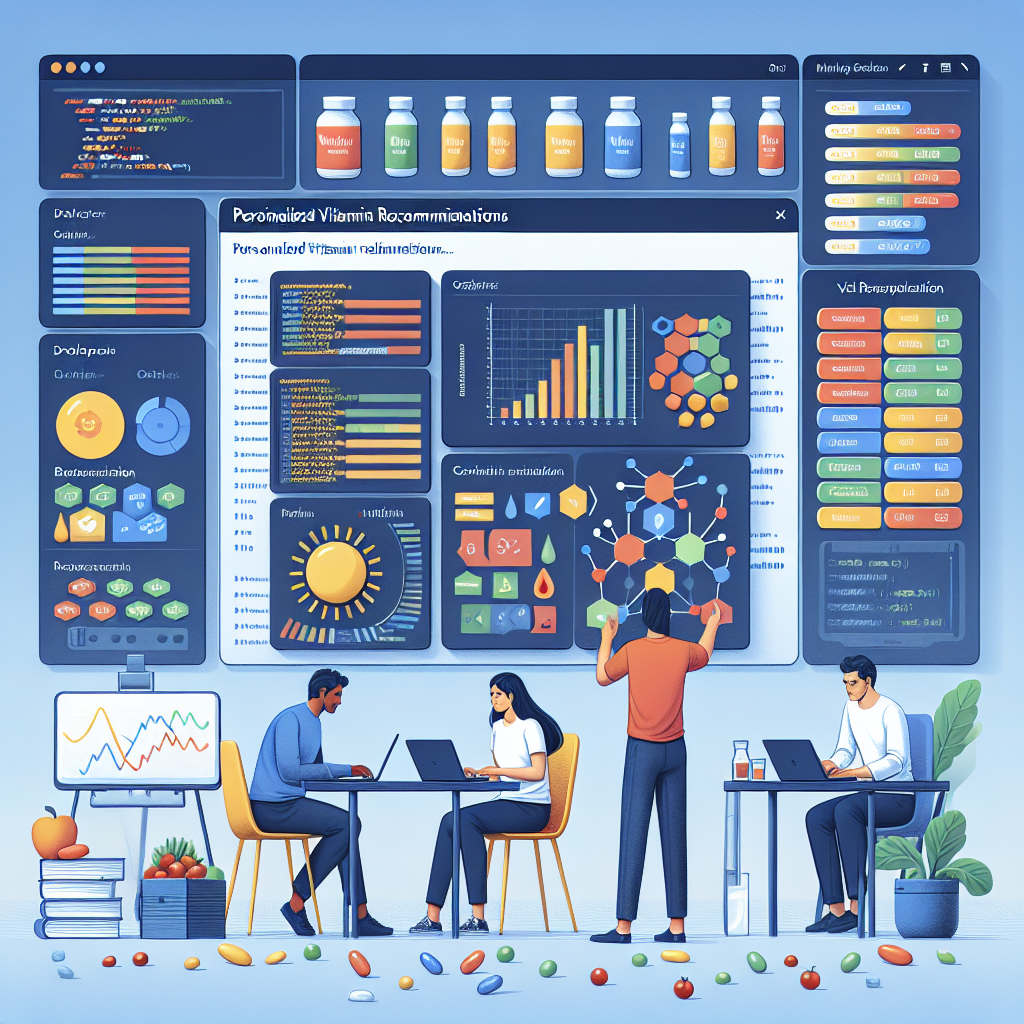Coding Solutions for Personalized Vitamin Recommendations

Discover the power of personalized vitamin recommendations through our innovative coding solutions. Start optimizing your health today! Click here to learn more.
Implementing Machine Learning for Personalized Vitamin Recommendations
In the rapidly evolving world of health and wellness, personalized vitamin recommendations have emerged as a revolutionary approach to meet individual nutritional needs. This innovative concept leverages the power of technology, particularly coding and machine learning, to provide tailored vitamin suggestions based on a person’s unique health profile.
Machine learning, a subset of artificial intelligence, is a powerful tool that enables computers to learn from data and make predictions or decisions without being explicitly programmed. In the context of personalized vitamin recommendations, machine learning algorithms can analyze a vast array of health data, including dietary habits, lifestyle factors, genetic information, and medical history, to generate customized vitamin recommendations.
The first step in implementing machine learning for personalized vitamin recommendations involves data collection. This process requires a comprehensive health questionnaire that captures all relevant information about a person’s health and lifestyle. The collected data is then preprocessed to remove any inconsistencies or errors, ensuring that the machine learning algorithm has a clean dataset to work with.
Once the data is ready, it is fed into a machine learning model. This model is essentially a mathematical representation of a real-world process, in this case, the process of determining which vitamins a person needs based on their health data. The model is trained on a portion of the collected data, learning to identify patterns and relationships that can be used to make predictions.
The beauty of machine learning lies in its ability to improve over time. As more data is collected and the model is exposed to a wider variety of health profiles, it becomes better at making accurate vitamin recommendations. This iterative process of learning and improving is what makes machine learning such a powerful tool for personalized health care.
The output of the machine learning model is a list of recommended vitamins for each individual. These recommendations are not random; they are based on the patterns and relationships the model has learned from the data. For example, if the model has learned that people with a certain genetic marker tend to be deficient in vitamin B12, it will recommend a B12 supplement to individuals with that marker.
However, it’s important to note that while machine learning can provide valuable insights and recommendations, it should not replace professional medical advice. The recommendations generated by the machine learning model should be used as a guide, and individuals should consult with a healthcare professional before making any changes to their diet or supplement regimen.
In conclusion, the implementation of machine learning for personalized vitamin recommendations represents a significant advancement in the field of health and wellness. By harnessing the power of coding and machine learning, we can provide individuals with tailored vitamin recommendations that cater to their unique health needs. This not only enhances the effectiveness of vitamin supplementation but also empowers individuals to take control of their health in a more informed and personalized way. As technology continues to evolve, we can expect to see even more innovative applications of machine learning in the realm of personalized health care.
Exploring Coding Techniques for Creating a Personalized Vitamin Recommendation System

The advent of technology has revolutionized various sectors, including the health and wellness industry. One of the most intriguing developments is the use of coding solutions to create personalized vitamin recommendation systems. This innovative approach leverages the power of programming to analyze individual health data and provide tailored vitamin recommendations, thereby promoting optimal health and wellness.
The foundation of a personalized vitamin recommendation system lies in the collection and analysis of individual health data. This data can be obtained from various sources such as medical records, dietary habits, lifestyle choices, and genetic information. Once the data is collected, it is processed and analyzed using various coding techniques. The most commonly used programming languages for this purpose are Python and R, known for their powerful data analysis capabilities.
Python, with its extensive libraries like Pandas and NumPy, allows for efficient data manipulation and analysis. For instance, Pandas can be used to clean and organize the data, while NumPy can perform complex mathematical operations. On the other hand, R, with its packages like ggplot2 and dplyr, is excellent for data visualization and transformation. These tools enable the system to identify patterns and correlations in the data, which are crucial in determining the individual’s vitamin needs.
Machine learning algorithms also play a pivotal role in creating a personalized vitamin recommendation system. These algorithms can learn from the data and make predictions or decisions without being explicitly programmed to do so. For instance, a decision tree algorithm can be used to classify individuals based on their vitamin needs. This algorithm creates a model that predicts the value of a target variable by learning simple decision rules inferred from the data features.
Moreover, the use of artificial intelligence (AI) in these systems cannot be overstated. AI can analyze vast amounts of data quickly and accurately, making it an invaluable tool in personalized health care. For example, AI can be used to predict an individual’s future vitamin needs based on their current health status and lifestyle habits. This predictive analysis can help individuals take proactive steps towards maintaining their health.
However, creating a personalized vitamin recommendation system is not without its challenges. One of the main challenges is ensuring the privacy and security of the individual’s health data. This can be addressed by implementing robust security measures in the coding process, such as data encryption and secure coding practices. Additionally, the system must be designed to comply with health data regulations, such as the Health Insurance Portability and Accountability Act (HIPAA) in the U.S.
Another challenge is ensuring the accuracy of the recommendations. This can be achieved by continuously updating the system with the latest research on vitamins and health. The system should also be designed to consider the individual’s unique circumstances, such as allergies or medical conditions, which may affect their vitamin needs.
In conclusion, coding solutions offer a promising approach to creating personalized vitamin recommendation systems. By leveraging the power of programming languages, machine learning algorithms, and artificial intelligence, these systems can analyze individual health data and provide tailored vitamin recommendations. However, it is crucial to address the challenges of data privacy, security, and accuracy to ensure the system’s effectiveness and reliability. With the right coding techniques and strategies, personalized vitamin recommendation systems can play a significant role in promoting optimal health and wellness.
The Role of Data Science in Developing Personalized Vitamin Recommendations
The advent of data science has revolutionized numerous sectors, including healthcare and nutrition. One of the most intriguing applications of data science in these fields is the development of personalized vitamin recommendations. This innovative approach leverages coding solutions to analyze individual health data and provide tailored nutritional advice, thereby enhancing overall wellness.
Data science, at its core, is the extraction of meaningful insights from vast amounts of data. It employs a combination of statistical, mathematical, and computational techniques to interpret, manage, and utilize data effectively. In the context of personalized vitamin recommendations, data science plays a pivotal role in analyzing individual health data and determining the specific nutritional needs of each person.
The process begins with the collection of health data from individuals. This data can include information about a person’s age, gender, weight, height, lifestyle, dietary habits, and medical history. Advanced coding solutions are then used to store, manage, and analyze this data. These solutions are designed to handle large volumes of data and perform complex calculations quickly and accurately.
Once the data is collected and organized, data scientists use sophisticated algorithms to analyze it. These algorithms are capable of identifying patterns and relationships within the data that may not be immediately apparent. For instance, they might find a correlation between a person’s dietary habits and their vitamin deficiencies, or between their lifestyle and their nutritional needs. These insights can then be used to generate personalized vitamin recommendations.
The use of coding solutions in this process is crucial. Without them, it would be nearly impossible to manage and analyze the vast amounts of data involved. Moreover, coding solutions allow for the automation of many aspects of the process, making it more efficient and less prone to error. They also enable the development of user-friendly interfaces through which individuals can receive their personalized vitamin recommendations.
However, the use of data science in developing personalized vitamin recommendations is not without its challenges. One of the main challenges is ensuring the accuracy and reliability of the data. This requires rigorous data validation and cleaning processes, which can be time-consuming and complex. Additionally, there are ethical considerations related to data privacy and security that must be addressed.
Despite these challenges, the potential benefits of using data science for personalized vitamin recommendations are immense. By providing individuals with tailored nutritional advice, it can help them improve their health and wellbeing. It can also contribute to the prevention and management of various health conditions, such as vitamin deficiencies, obesity, and chronic diseases.
Furthermore, the use of data science in this area opens up new opportunities for research and innovation. For instance, it could lead to the development of more advanced algorithms for analyzing health data, or to the creation of new coding solutions for managing and visualizing this data. It could also pave the way for the integration of personalized vitamin recommendations with other aspects of healthcare, such as personalized medicine and telemedicine.
In conclusion, data science plays a crucial role in the development of personalized vitamin recommendations. Through the use of advanced coding solutions, it enables the collection, management, and analysis of individual health data, leading to the generation of tailored nutritional advice. Despite the challenges involved, the potential benefits of this approach are significant, making it a promising area for future research and innovation.